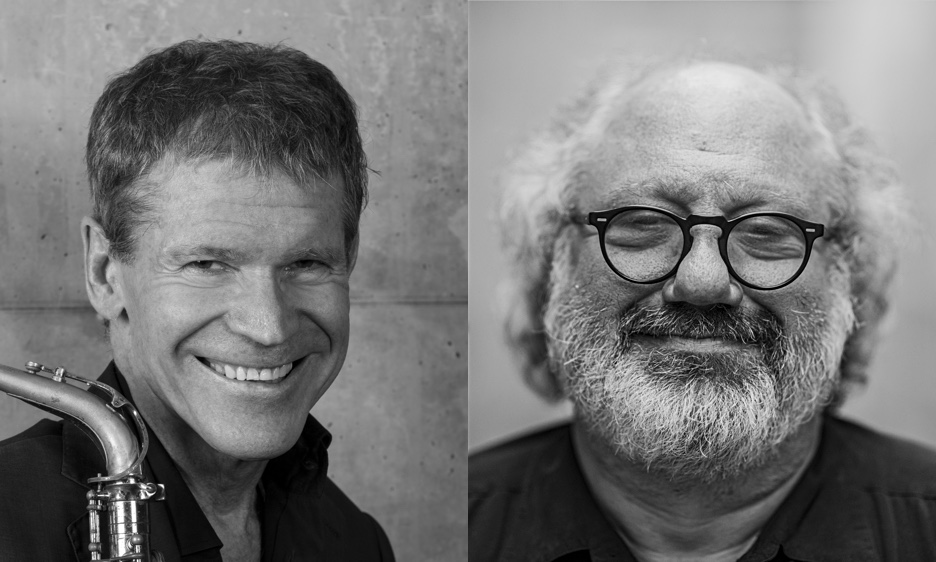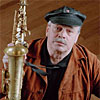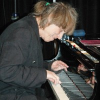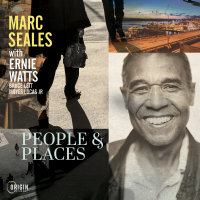Home » Jazz Articles » Interview » David Sanborn: Night Music and Beyond with Hal Willner
David Sanborn: Night Music and Beyond with Hal Willner

Hal knew how to take people to some place where they subconsciously wanted to go but had not gone yet. To get there they had to kind of surrender part of their ego and discover what they could do together.

Sonny Rollins
saxophoneb.1930

Leonard Cohen
vocals1934 - 2016

Tim Berne
saxophone, altob.1954

Ray Charles
piano and vocals1930 - 2004

Hank Crawford
saxophone, alto1934 - 2009
The show was the brainchild of saxophone legend David Sanborn, but soon became the lab through which

Hal Willner
producer1957 - 2020
Click here to read the Hal Willner memorial article.
All About Jazz: Did you meet Hal Willner while working together on Night Music?
David Sanborn: No, I had known Hal for years. I don't remember where we first met. It might have been when I was doing Saturday Night Live in the late seventies. We became friends and saw each other from time to time. We had a lot of musical affinity and shared a lot of the same taste in music.
We always talked about working together. During the first season of Night Music we did not really have a music producer. Musically, those early episodes were put together by

Marcus Miller
bassb.1959
For one of the last shows of the first season, we brought Hal on board as a music producer. That's the show in which Hal paired Leonard Cohen with Sonny Rollins; that episode also featured Was (Not Was) [Note by the editor: season 1, episode 19 -see video below]. I thought that show was amazing, one of those things that didn't seem like it was going to work on paper, but then it came across beautifully. To this day, it remains as one of my favorite episodes of Night Music. After that I lobbied very hard to get Hal on the second season of the show as the music producer. Hal was already "in house" since at the time he was working with Broadway Video, Lorne Michaels' production company, which was behind both Saturday Night Live and Night Music. Lorne thought it was a good idea and so we started the second season with Hal as the music producer. It was a collaboration, but the process was primarily driven by Hal, and I was more than happy with that.
The shows became strange and wonderful. Sometimes puzzling, sometimes irritating, but always brilliant. As I've said in the past, in a way Hal was like Fellini, who was his hero (click here to read an interview with Hal Willner where he recounts how he met Federico Fellini). They both created these fantastic visions, these worlds that you didn't know could exist. Just strange, beautiful and completely amazing.
AAJ: What was the M.O. that you and Mr. Willner applied in the production of Night Music?
DS: We would talk about what he wanted to do. He had a clear idea of the kinds of people that he wanted to have on the show. In many cases he was friends with them, through other situations he was involved in. We had

Sting
bass, electricb.1951

Miles Davis
trumpet1926 - 1991

Phil Woods
saxophone, alto1931 - 2015
Later on, I asked Hal to produce the album that I did when we were still working on Night Music, Another Hand, which remains my favorite record among all the ones that I've done. For that record he brought NRBQ's

Terry Adams
piano
Charlie Haden
bass, acoustic1937 - 2014

Jack DeJohnette
drumsb.1942

Bill Frisell
guitar, electricb.1951

Joey Baron
drumsb.1955
AAJ: How did working with Hal Willner on Another Hand differ from your collaboration for Night Music?
DS: In a few ways Another Hand was a different experience. Since that was my album the most obvious difference was that the focus was on me and my music, whereas on the show we'd have a variety of guests and they were the featured artists. As a consequence, we would have different dynamics and different colors all the time. For my album on the other hand we had a more unified, singular, point of view. Other than that, however, the two experiences had lots of similarities. In particular, there was the same atmosphere around Hal all the time. He brought this kind of dream-like quality, which was certainly the approach that we had thought for the album. When I look back on it, it still feels like a really great dream. To Hal's great credit, he understood things about me that I was not aware of. He opened doors for me, he opened my eyes to things I didn't realize I was capable of. I'm always amazed when I listen back to that record, that there's a coherence and a continuity to it. There was a real narrative at play.
Hal brought that same vibe on the TV show through his role as a producer, and the way he put things together. I remember the episode we did with Sting singing Bill Withers' "Ain't No Sunshine" with Bill Frisell and

Fareed Haque
guitarb.1963

Hank Roberts
cellob.1954
I played the sopranino. The result was a very ethereal version of that song. It is definitely one of the great memories I have of Night Music.
AAJ: How was he able to convince musicians to get involved with these experiments?
DS: You mean how did he con people into doing these things? [Laughs] Well, Hal was so passionate about things. He believed so deeply in his vision. You could see that, and so he engendered trust. I really can't explain it any better.
To this day I am scratching my head thinking, "How the hell did he talk people into doing that?" I mean we got

Al Green
vocalsb.1946

Sun Ra
piano1914 - 1993
AAJ: How did you manage to get that on TV? Obviously the times were quite different...
DS: That's a whole other story onto itself... To give you a bit of context, my manager, Pat Rains, and I were friends with David Saltz, who was a music producer at ABC Sports but had always been interested in producing a music show. He was very close to Michelob, a big sponsor for sport shows, and got them into the idea of sponsoring a music show. David and Pat came to me with an idea to do a music show on TV, and I immediately thought of this TV show that had a big influence on me in the '50s called the "Robert Herridge Theater," which was basically a kind of a fly-on-the-wall situation where Robert Herridge showed a bunch of musicians sitting around in a big studio, hanging out together, jamming and talking to each other... He would cut from a shot of

Billie Holiday
vocals1915 - 1959

Count Basie
piano1904 - 1984

Gerry Mulligan
saxophone, baritone1927 - 1996

Lester Young
saxophone1909 - 1959
We went to speak to Lorne Michaels of Saturday Night Live. Michelob was thrilled about that. Over time it became less about the Robert Herridge Theater idea and more about making the general idea work in 1980s television. It got all done in-house at Broadway Video, the production company of Lorne Michaels. He brought in John Head as the actual producer. I got together a house band featuring

Marcus Miller
bassb.1959

Omar Hakim
drumsb.1959

Hiram Bullock
guitar, electric1955 - 2008

Philippe Saisse
keyboardsb.1947

Don Alias
percussion1939 - 2006
All in all, we were trying to do something which could be on commercial television while being also interesting and different. At some point however, and I don't know exactly what happened, the show got canceled. My guess is that Night Music got a little too far out for the sponsor. I remember one of the representatives from Michelob coming to one show in which we had The Residents, Conway Twitty and the Kronos Quartet on it. The Residents sang a very unique version of the

Elvis Presley
vocals1935 - 1977

Eric Clapton
guitar and vocalsb.1945

Randy Newman
pianob.1943
But you know what? In the grand scheme of things, I think what we did had a profound effect on both musicians and music fans, especially the younger audience, who could tune into the show and realize, "Wow, you can really do strange shit," and discover music they weren't necessarily hearing, like, for instance, when they saw The Pixies and all these weird combinations of people we had on the show. I remember once meeting Eddie Vedder of Pearl Jam, who, years later, made a point of saying to me how much of an effect the show had on him. As we get more and more distance from it, my impression is that it was a groundbreaking show, especially when seen in the context of the times in which it was shot. Hal was certainly the catalyst for that, and for the things that made those shows really historic.
AAJ: Is there a special moment or anecdote or event that immediately comes to mind when thinking of Hal Willner?
DS: Without a doubt, the memories associated with the first episode of Night Music that Hal produced, with Leonard Cohen, Sonny Rollins and Was (Not Was). That show to me epitomizes all that was great about Night Music and Hal.
Photo credit: Scott Chernis
Tags
Comments
PREVIOUS / NEXT
Support All About Jazz
 All About Jazz has been a pillar of jazz since 1995, championing it as an art form and, more importantly, supporting the musicians who make it. Our enduring commitment has made "AAJ" one of the most culturally important websites of its kind, read by hundreds of thousands of fans, musicians and industry figures every month.
All About Jazz has been a pillar of jazz since 1995, championing it as an art form and, more importantly, supporting the musicians who make it. Our enduring commitment has made "AAJ" one of the most culturally important websites of its kind, read by hundreds of thousands of fans, musicians and industry figures every month.






 Buy Now
Buy Now






















